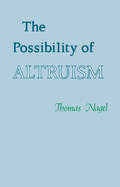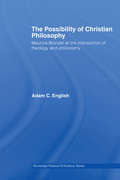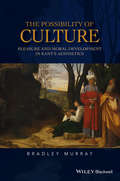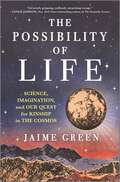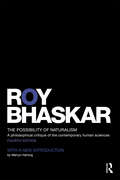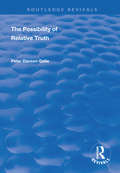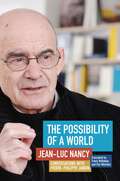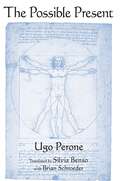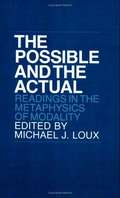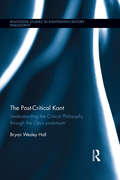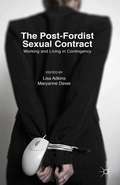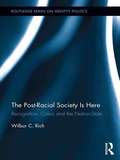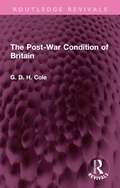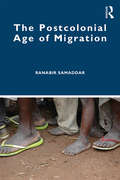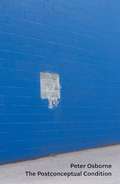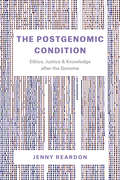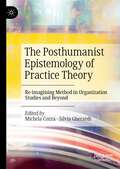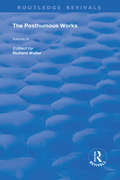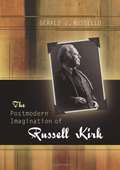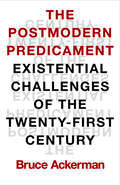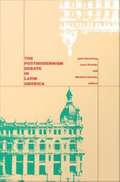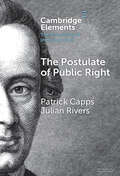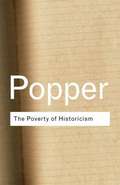- Table View
- List View
The Possibility of Altruism
by Thomas NagelJust as there are rational requirements on thought, there are rational requirements on action. This book defends a conception of ethics, and a related conception of human nature, according to which altruism is included among the basic rational requirements on desire and action.
The Possibility of Christian Philosophy: Maurice Blondel at the Intersection of Theology and Philosophy (Routledge Radical Orthodoxy #Vol. 2)
by Adam C. EnglishThis is the first to book to explore Blondel's entire body of work and provides an introduction to his life and writings and their relevance to the debates surrounding the radical orthodoxy identity. Detailing Blondel's impressive research output during the first half of the twentieth century, this volume highlights his relevance to philosophy and religion today and his commitment that philosophy cannot be separated from a theological narrative. This highly original work will be of great interest to scholars of philosophy and religion, particularly the students of the radical orthodoxy movement.
The Possibility of Culture: Pleasure and Moral Development in Kant's Aesthetics (New Directions in Aesthetics)
by Bradley MurrayThe Possibility of Culture: Pleasure and Moral Development in Kant’s Aesthetics presents an in-depth exploration and deconstruction of Kant’s depiction of the ways in which aesthetic pursuits can promote personal moral development. Presents an in-depth exploration of the connection between Kant’s aesthetics and his views on moral development Reveals the links between Kant’s aesthetics and his anthropology and moral psychology Explores Kant’s notion of genius and his views on the connections between the social aspects of taste and moral development Addresses aspects of Kant’s ethical theory that will interest scholars working in ethics and moral psychology
The Possibility of Discussion: Relativism, Truth and Criticism of Religious Beliefs (Ashgate New Critical Thinking In Philosophy Ser.)
by Hugo StrandbergAnswering the question 'How is fruitful discussion possible?', this book addresses the central philosophical issue of how reason shall be understood and how it is limited. This study argues that the understanding of discussion according to which it necessarily starts from putative universal norms and rules for argumentation is problematic, among other reasons since such rules are unfruitful in contexts where there are vast disagreements such as religion. Inspired by Wittgensteinian ideas, Strandberg develops instead a new way of understanding discussion, truth and rationality which escapes these problems, and shows how this solution can be used to answer the accusation against Wittgensteinian philosophy for being conservative and resulting in fideism.
The Possibility of Life: Science, Imagination, and Our Quest for Kinship in the Cosmos
by Jaime Green*An NPR Science Friday Book Club Pick**A "Next Big Idea Book Club" Must Read**A Gizmodo New Release Pick for April**A BookRiot Science Book to Add to Your TBR**A Wired Book to Read for Spring*"A dazzling feat of imagination and synthesis."—Ed Yong, Pulitzer Prize winner and author of An Immense WorldA spellbinding exploration of alien life and the cosmos, examining how the possibility of life on other planets shapes our understanding of humanityOne of the most powerful questions humans ask about the cosmos is: Are we alone? While the science behind this inquiry is fascinating, it doesn&’t exist in a vacuum. It is a reflection of our values, our fears, and most importantly, our enduring sense of hope. In The Possibility of Life, acclaimed science journalist Jaime Green traces the history of our understanding, from the days of Galileo and Copernicus to our contemporary quest for exoplanets. Along the way, she interweaves insights from science fiction writers who construct worlds that in turn inspire scientists. Incorporating expert interviews, cutting-edge astronomy research, philosophical inquiry, and pop culture touchstones ranging from A Wrinkle in Time to Star Trek to Arrival, The Possibility of Life explores our evolving conception of the cosmos to ask an even deeper question: What does it mean to be human?
The Possibility of Naturalism: A philosophical critique of the contemporary human sciences (Critical Realism Ser.)
by Roy BhaskarSince its original publication in 1979, The Possibility of Naturalism has been one of the most influential works in contemporary philosophy of science and social science. It is one of the cornerstones of the critical realist position, which is now widely seen as offering perhaps the only viable alternative to positivism and post positivism. This fourth edition contains a new foreword from Mervyn Hartwig, who is founding editor of the Journal of Critical Realism and editor and principal author of the Dictionary of Critical Realism.
The Possibility of Relative Truth: An Examination of the Possibility of Truth Relativism Within Coherence and Correspondence Host Theories of Truth (Routledge Revivals)
by Peter Davson-GalleFirst published in 1998, this book is an investigation of the possibility of articulating a coherent thesis of truth relativism within first, a host correspondence theory of truth and second, a host coherence theory of truth. The type of relativism addressed in the book is what is sometimes called ’framework relativism’ - that where truth is relativised to a framework of belief or conceptual scheme. A further restraint is that a global relativistic thesis is sought - one which is relativistic about all truths. The book does not set itself the task of defending relativism but just that of seeking a coherent articulation of it.
The Possibility of a World: Conversations with Pierre-Philippe Jandin
by Jean-Luc Nancy Pierre-Philippe JandinIn this series of interviews, Jean-Luc Nancy reviews his life’s work. But like Schlegel’s historian—“a prophet facing backwards”—Nancy takes this opportunity to rummage through the history of art, philosophy, religion, and politics in search of new possibilities that remain to be thought.This journey through Nancy’s thought is interspersed with accounts of places and events and deeply personal details. The result is at once unpretentious and encyclopedic: Concepts are described with remarkable nuance and specificity, but in a language that comes close to that of everyday life.As Nancy surveys his work, he thinks anew about democracy, community, jouissance, love, Christianity, and the arts. In the end, this is a book about the possibility of a world—a world that must be greeted because it is, as Nancy says, already here.
The Possible Present (SUNY series in Contemporary Italian Philosophy)
by Ugo PeroneThe Possible Present unfolds from within a freely reinterpreted hermeneutic perspective and provides an original theoretical proposal on the topic of time. In dialogue especially with the philosophies of Husserl and Heidegger, but resorting also to suggestions coming from a theological background (Barth and Bonhoeffer), the work proposes a personal and original theory of time centered on a conception of the present that does not reduce temporality to a succession of mere instants. When one claims that time is ungraspable, one refers neither to the past (which is rather irretrievable) nor to the future (which is rather uncertain) but to the present. The present in which we are is in fact what fades from our hands without break. The present is a decisive threshold for finite existence. It is the threshold where past and future meet and can give birth to a livable horizon of meaning. Dilating the present and giving it a meaningful chance to be is a task for philosophy. It is the attempt of giving time to time and also giving it shape, place, and space. To succeed at this task while rediscovering the sources of a narrative way of thinking that in truth it has never abandoned, philosophy must go back and turn time into the primary object of discourse, like in stories, which are precisely the attempt at disposing the temporal flow of events according to a meaning. Perone argues that in time, however, what passes is not simply decline, but rather something irreducible, an exteriority that must be said.
The Possible and the Actual: Readings in the Metaphysics of Modality
by Michael J. LouxThis well-chosen collection of fifteen important essays in the fields of philosophical logic and metaphysics addresses questions relating to the nature and status of possible worlds.
The Post colonial and Imperial Experience in American Transcendentalism
by Marek ParyzAnalyses literary representations of the American experience in selected works of Ralph Waldo Emerson, Henry David Thoreau, and Walt Whitman. Reveals the ambivalence that underlay the cultural and political development of the United States as a former colony.
The Post-Critical Kant: Understanding the Critical Philosophy through the Opus Postumum (Routledge Studies in Eighteenth-Century Philosophy #10)
by Bryan HallIn this book, Bryan Wesley Hall breaks new ground in Kant scholarship, exploring the gap in Kant’s Critical philosophy in relation to his post-Critical work by turning to Kant’s final, unpublished work, the so-called Opus Postumum. Although Kant considered this project to be the "keystone" of his philosophical efforts, it has been largely neglected by scholars. Hall argues that only by understanding the Opus Postumum can we fully comprehend both Kant’s mature view as well as his Critical project. In letters from 1798, Kant claims to have discovered a "gap" in the Critical philosophy that requires effecting a "transition from the metaphysical foundations of natural science to physics"; unfortunately, Kant does not make clear exactly what this gap is or how the transition is supposed to fill the gap. To resolve these issues, Hall draws on the Opus Postumum, arguing that Kant’s transition project can solve certain perennial problems with the Critical philosophy. This volume provides a powerful alternative to all current interpretations of the Opus Postumum, arguing that Kant’s transition project is best seen as the post-Critical culmination of his Critical philosophy. Hall carefully examines the deep connections between the Opus Postumum and the view Kant develops in the Critique of Pure Reason, to suggest that properly understanding the post-Critical Kant will significantly revise our view of Kant’s Critical period.
The Post-Fordist Sexual Contract: Working and Living in Contingency
by Lisa Adkins Maryanne DeverThis collection analyzes shifting relationships between gender and labour in post-Fordist times. Contingency creates a sexual contract in which attachments to work, mothering, entrepreneurship and investor subjectivity are the new regulatory ideals for women over a range of working arrangements, and across classed and raced dimensions.
The Post-Racial Society is Here: Recognition, Critics and the Nation-State (Routledge Series on Identity Politics)
by Wilbur C. RichIn a provocative and controversial analysis, Wilbur C. Rich’s The Post-Racial Society is Here conclusively demonstrates that nation is in midst of a post-racial society. Yet many Americans are skeptical of this fundamental social transformation. The failure of recognition is related to the remnants of the previous race-based society. Recognizing the advent of a post-racial society is not to gainsay recurrent racial incidents or a denial of the socio-economic gap between the races. Using the findings of historians and social scientists, this book outlines why the construction and deconstruction of the race-based society was such a difficult and daunting enterprise. Starting from the nation’s inception, Rich examines how the nation elites used racial language, separate schools, and the media to divide Americans. After World War II, the nation used U.S. Supreme Court rulings and the Congressional passage of Civil Rights laws to dismantle the institutional support for racial segregation and discrimination. The black Civil Rights Movement facilitated and consolidated the movement toward socio-political inclusion of African Americans. Rich alerts the reader to the unprecedented progress made and why the forces of the new global economy demand that we move faster to make society more inclusive. This thought-provocking book should interest scholars of sociology, Africana Studies, American studies and African American politics.
The Post-War Condition of Britain (Routledge Revivals)
by G.D.H. ColeFirst published in 1956, The Post-War Condition of Britain measures the extent of changes in Britain since the thirties. It contains more than two hundred tables on such matters as the national income, employment, production and productivity, investment and consumption; health, education, housing, and the insurance, assistance and similar services; on Trade Unions and industrial relations; class structure, political attitudes and party organizations; and the problems of local government and town and country planning. It is simply written, demanding from the reader the minimum of technical knowledge of economics or other specialized studies, and it should serve as an invaluable reference book for all who need exact information.
The Postcolonial Age of Migration
by Ranabir SamaddarThis book critically examines the question of migration that appears at the intersection of global neo-liberal transformation, postcolonial politics, and economy. It analyses the specific ways in which colonial relations are produced and reproduced in global migratory flows and their consequences for labour, human rights, and social justice. The postcolonial age of migration not only indicates a geopolitical and geo-economic division of the globe between countries of the North and those of the South marked by massive and mixed population flows from the latter to the former, but also the production of these relations within and among the countries of the North. The book discusses issues such as transborder flows among countries of the South; migratory movements of the internally displaced; growing statelessness leading to forced migration; border violence; refugees of partitions; customary and local practices of care and protection; population policies and migration management (both emigration and immigration); the protracted nature of displacement; labour flows and immigrant labour; and the relationships between globalisation, nationalism, citizenship, and migration in postcolonial regions. It also traces colonial and postcolonial histories of migration and justice to bear on the present understanding of local experiences of migration as well as global social transformations while highlighting the limits of the fundamental tenets of humanitarianism (protection, assistance, security, responsibility), which impact the political and economic rights of vast sections of moving populations. Topical and an important intervention in contemporary global migration and refugee studies, the book offers new sources, interpretations, and analyses in understanding postcolonial migration. It will be useful to scholars and researchers of migration studies, refugee studies, border studies, political studies, political sociology, international relations, human rights and law, human geography, international politics, and political economy. It will also interest policymakers, legal practitioners, nongovernmental organisations, and activists.
The Postconceptual Condition: Postconceptual Condition
by Peter OsborneTracking the postconceptual dimensions of contemporary artIf, as Walter Benjamin claimed, “it is the function of artistic form … to make historical content into a philosophical truth,” then it is the function of criticism to recover and to complete that truth. Never has this been more necessary or more difficult than with respect to contemporary art. Contemporary art is a point of condensation of a vast array of social and historical forces, economic and political forms and technologies of image production. Contemporary art expresses this condition, Osborne maintains, through its distinctively postconceptual form. These essays—extending the scope and arguments of Osborne’s Anywhere or Not at All: Philosophy of Contemporary Art—move from philosophical consideration of the changing temporal conditions of capitalist modernity, via problems of formalism, the politics of art and the changing shape of art institutions, to interpretation and analysis of particular works by Akram Zataari, Xavier Le Roy and Ilya Kabakov, and the postconceptual situation of a crisis-ridden New Music.
The Postgenomic Condition: Ethics, Justice, & Knowledge after the Genome
by Jenny ReardonNow that we have sequenced the human genome, what does it mean? In The Postgenomic Condition, Jenny Reardon critically examines the decade after the Human Genome Project, and the fundamental questions about meaning, value and justice this landmark achievement left in its wake. Drawing on more than a decade of research—in molecular biology labs, commercial startups, governmental agencies, and civic spaces—Reardon demonstrates how the extensive efforts to transform genomics from high tech informatics practiced by a few to meaningful knowledge beneficial to all exposed the limits of long-cherished liberal modes of knowing and governing life. Those in the American South challenged the value of being included in genomics when no hospital served their community. Ethicists and lawyers charged with overseeing Scottish DNA and data questioned how to develop a system of ownership for these resources when their capacity to create things of value—new personalized treatments—remained largely unrealized. Molecular biologists who pioneered genomics asked whether their practices of thinking could survive the deluge of data produced by the growing power of sequencing machines. While the media is filled with grand visions of precision medicine, The Postgenomic Condition shares these actual challenges of the scientists, entrepreneurs, policy makers, bioethicists, lawyers, and patient advocates who sought to leverage liberal democratic practices to render genomic data a new source of meaning and value for interpreting and caring for life. It brings into rich empirical focus the resulting hard on-the-ground questions about how to know and live on a depleted but data-rich, interconnected yet fractured planet, where technoscience garners significant resources, but deeper questions of knowledge and justice urgently demand attention.
The Posthumanist Epistemology of Practice Theory: Re-imagining Method in Organization Studies and Beyond
by Silvia Gherardi Michela CozzaWithin and beyond organization studies, an epistemology of practice allows us to view the ongoing interaction between doing and knowing, the knowing subject and the known object, social and material, humans, nonhumans, more-than-humans. This book is a collection of reflections by scholars across the social sciences around epistemological practices and the epistemology of posthumanist practice theory. Practice theories and practice-based studies have developed a rich methodology for studying working practices. This book is an epistemological reflection that challenges the distinction between theory and method, questions the knowing practices that give form to the object of knowledge, how they draw boundaries between what comes to matter and what is excluded from mattering. It will be of great interest to scholars and students of organization studies and beyond, allowing social science researchers to rethink their positioning within their own research practices and leaving them open to a broader, looser and more generous understanding of qualitative methodologies.Chapters 1, 2, 5 and 6 are available open access under a Creative Commons Attribution 4.0 International License via link.springer.com.
The Posthumous Works of Robert Hooke (Routledge Revivals)
by Robert HookePublished in 1971: This book represents the Posthumous works of the author, as well as lectures on Philosophy, Astronomy, and Science.
The Postmodern Imagination of Russell Kirk
by Gerald J. RusselloExamines such concepts of Russell Kirk's thought as imagination, historical consciousness, the interplay between the individual and tradition, and the role of narrative in constructing individual and societal identity. Focuses on Kirk's role in the development of the new conservatism of the 1950s and 1960s and his critique of modernity.
The Postmodern Predicament: Existential Challenges of the Twenty-First Century
by Bruce AckermanOne of our most influential political theorists offers a boundary-breaking—and liberating—perspective on the meaning of life in the internet age Human beings have taken one thing for granted since our earliest days: we are bodily creatures dealing with one another on a face-to-face basis. The internet has shattered this fundamental feature of human existence. We are suddenly living our lives in two worlds at once—shifting endlessly from virtual to physical reality as we reach out to others. Worse yet, we are developing different personal identities in our two worlds. We say and do things in virtual reality that flatly contradict our face-to-face commitments to family, friends, and fellow-workers—and vice versa. The Postmodern Predicament explores these dilemmas at each phase of the life cycle, beginning at the moment a young child picks up a cell phone. The existentialist tradition of the twentieth century provides a precious perspective on our postmodern dilemmas. Thinkers and doers like Simone de Beauvoir and Jean-Paul Sartre considered the fragmentation of modern life as a central source of contemporary anxieties. Like them, Ackerman views the challenges of the internet age as a political, no less than personal, problem—and proposes concrete reforms that that could mobilize broad-based support for democracy against demagogic assaults on its very foundations.
The Postmodernism Debate in Latin America
by John Beverley Michael Aronna José OviedoPostmodernism may seem a particularly inappropriate term when used in conjunction with a region that is usually thought of as having only recently, and then unevenly, acceded to modernity. Yet in the last several years the concept has risen to the top of the agenda of cultural and political debate in Latin America. This collection explores the Latin American engagement with postmodernism, less to present a regional variant of the concept than to situate it in a transnational framework. Recognizing that postmodernism in Latin America can only inaccurately be thought of as having traveled from an advanced capitalist "center" to arrive at a still dependent neocolonial "periphery," the contributors share the assumption that postmodernism is itself about the dynamics of interaction between local and metropolitan cultures in a global system in which the center-periphery model has begun to break down. These essays examine the ways in which postmodernism not only designates the effects of this transnationalism in Latin America, but also registers the cultural and political impact on an increasingly simultaneous global culture of a Latin America struggling with its own set of postcolonial contingencies, particularly the crisis of its political left, the dominance of neoliberal economic models, and the new challenges and possibilities opened by democratization. With new essays on the dynamics of Brazilian culture, the relationship between postmodernism and Latin American feminism, postmodernism and imperialism, and the implications of postmodernist theory for social policy, as well as the text of the Declaration from the Lacandon Jungle of the Zapatatista National Liberation Army, this expanded edition of boundary 2 will interest not only Latin Americanists, but scholars in all disciplines concerned with theories of the postmodern. Contributors. Xavier Alb, Jos Joaqun Brunner, Fernando Caldern, Enrique Dussel, Nstor Garca Canclini, Martn Hopenhayn, Neil Larsen, the Latin American Subaltern Studies Group, Norbert Lechner, Mara Milagros Lpez, Raquel Olea, Anbal Quijano, Nelly Richard, Carlos Rincn, Silviano Santiago, Beatriz Sarlo, Roberto Schwarz, and Hernn Vidal
The Postulate of Public Right (Elements in the Philosophy of Immanuel Kant)
by Patrick Capps Julian RiversKant's main work in the philosophy of law – the Doctrine of Right (1797) – is notoriously difficult for modern readers to understand. Kant clearly argues that rightful relations between human beings can only be achieved if we enter into a civil legal condition taking a defined constitutional form. In this Element, we emphasise that Kant considers this claim to be a postulate of practical reason, thus identifying the pure idea of the state as the culmination of his entire practical philosophy. The Doctrine of Right makes sense as an attempt to clarify the content of the postulate of public right and constructively interpret existing domestic and international legal arrangements in the light of the noumenal republic it postulates. Properly understood, Kant's postulate of public right is the epistemological foundation of a non-positivist legal theory that remains of central significance to modern legal philosophy and legal doctrinal method.
The Poverty Of Historicism
by Karl PopperKarl Popper's The Poverty of Historicism is a devastating criticism of the idea that there are fixed laws in history and that human beings are able to predict them. Popper dedicated the book to all those who fell victim to the fascist and communist belief in Inexorable Laws of Historical Destiny. It has inspired generations of intellectuals, policy makers and general readers alike. On its publication in 1957, it was hailed by Arthur Koestler as probably the only book published this year which will outlive the century.
